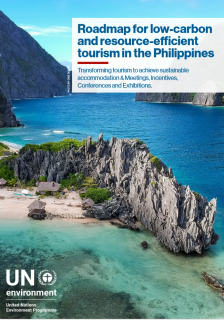
The Roadmap for Low-Carbon and Resource-Efficient Tourism in the Philippines is based on an analysis of the tourism value chain. This analysis covers the activities that happen within the hotels, restaurants and venues for meetings, incentives, conferences and exhibitions (MICE), but also the activities that supply them with energy and materials; for example food production, processing and associated waste arising. A notable exclusion from the analysis is international travel. The analysis revealed that many environmental impacts related to tourism happen outside hotels; for example, over 90% of water used in tourism value chains is used to grow food served in hotels and venues, and producing food also contributes 50% of total greenhouse gas (GHG) emissions.
Inside hotels, energy used in cooling and air-conditioning is the most significant source of GHG emissions. To help focus the delivery of this roadmap, a headline target of 30% reduction in greenhouse gas (GHG) emissions from fuel use, electricity use and purchased goods and services is proposed. This target is supported by three sub-targets relating to food waste, energy and waste water treatment:
- A 30% reduction in greenhouse gas emissions for hotels and MICE venues by 2030;
- A 30% reduction in non-renewable energy used by the hotels and MICE venues by 2030;
- A 50% reduction in the amount of food waste generated by hotels and MICE venues by 2030; and
- No untreated wastewater or sewage resulting from tourism operations in the Philippines reaches rivers, lakes and seas by 2025
